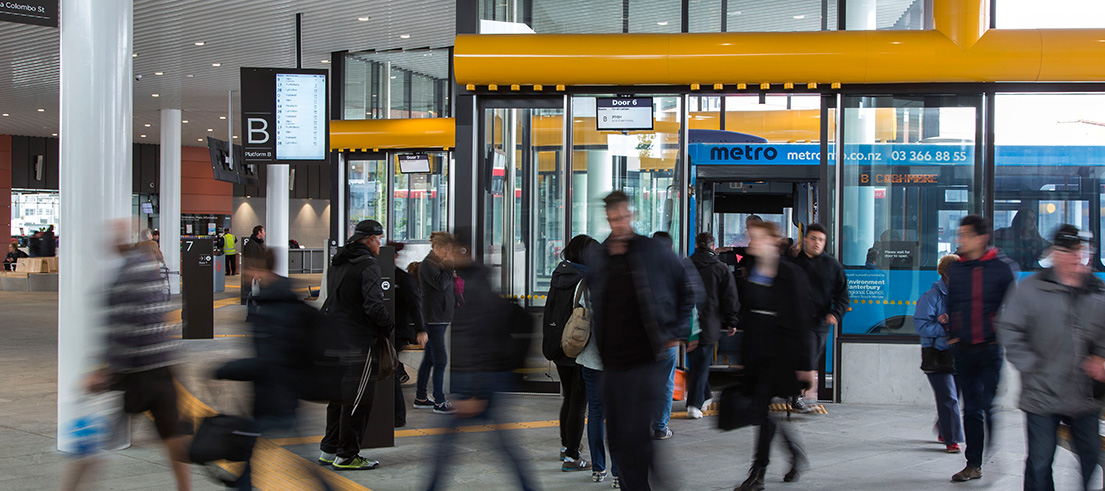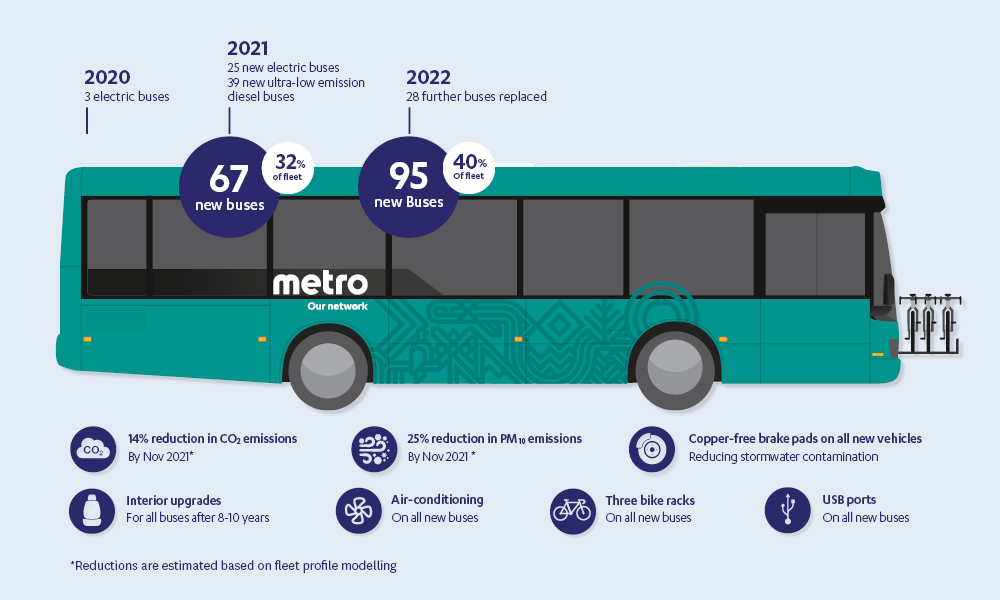Environment Canterbury accelerates move to new, low emission buses

Environment Canterbury's new bus contract procurement process was completed this week with all operator contracts signed. The new contracts will reduce public transport CO₂ emissions by 14% within their first year with the introduction of 25 new electric buses and 39 new low emission Euro 6 buses.
The procurement process has resulted in the award of 80% of the Greater Christchurch urban bus market to Go Bus. Red Bus retain 20% of the urban market and Ritchies Transport will operate the school services contracts.
Our Deputy Chair Peter Scott said that the award of these contracts represents a significant step forward for ratepayers of Greater Christchurch, who will benefit from environmental, service and financial benefits under the terms of the new contracts.
"Resoundingly, through our Regional Public Transport Plan consultation, our community told us they desire a fleet of environmentally friendly, low emission vehicles that offer a smooth and comfortable ride. Through these new contracts, we are beginning a transformation of the public transport experience; new, modern buses with a reduced emissions profile and all the conveniences our customers expect.
"The award of these contracts enables Environment Canterbury to maintain the momentum of change needed in our public transport system. The process has produced a result of excellent value for ratepayer spend, enabling us to now focus on growing both frequency and capacity in line with the Regional Public Transport Plan," he said.
The new bus contracts
The new contracts, commencing in November this year, include a total of 39 new low emission and 25 electric vehicles. The introduction of the new vehicles will be staggered over the first 12 months. Over half of the new vehicles will be manufactured locally in Rolleston. The total package (excluding the ferry service), worth $61.5 million, sees an increased contract price of $2.2 million which is a 3.7% increase on current contract price.
Deputy Chair Scott said that the benefits to Canterbury's economy are significant.
"As well as local vehicle production, the contracts support local employment and have bus driver employment contracts set above the living wage," he said.
The new contracts retain a portion of the existing fleet and enable their gradual replacement with low emission and zero emission buses. Also included is an option for us to enable a faster transition to an even greater number of low emission vehicles, if the community, through the upcoming Long-Term Plan 2021-2031 consultation, supports this.
Capacity constraints on core services at peak times will be reduced through a targeted transition to higher capacity vehicles on these routes, including 16 new, larger vehicles within the first year.
Transitioning to a zero-emissions fleet
Deputy Chair Scott said that the combination of new electric and low emission vehicles with the existing fleet is deliberate.
"In considering the appropriate use of ratepayer funds, our transition to a zero-emissions fleet is best achieved via this low emissions pathway, enabling us to balance the need to invest in more buses to make public transport more attractive and carry more people, while also progressively implementing zero-emission vehicles. These contracts provide us the ability to migrate to newer electric or hydrogen technologies in the coming years. The impact of purchasing an entire fleet of vehicles with the same technology today would be fiscally irresponsible for the future, as new, better technologies come online. This is why, after the initial investment, the introduction of an additional 28 new vehicles will be staggered over the next two years with further vehicle replacements in years 3-5 of the contracts,” he said.
"These new contracts set the scene for valued partnership with each of these operators over the next decade. Each has an integral part to play as we work to improve public transport across Greater Christchurch," said Deputy Chair Scott.
In its evaluation, Environment Canterbury was conscious of the learnings from the introduction of new public transport contracts in other regions and any potential for timetable or route changes will be minimised during transition. The new fleet will however provide improved flexibility for varying bus capacity depending on demand.
"We are working in partnership with our operators to develop a plan that ensures a seamless transition at the end of November 2020," said Deputy Chair Scott.
Highlights of the new contracts
- 64 new vehicles: 25 electric and 39 low emission Euro 6
- A total of 28 electric vehicles (including the three currently in service, bringing the electric vehicle total to 12% of the fleet)
- Another 28 vehicles replaced within the first two years, bringing the total vehicle replacement to 40% of the existing urban fleet
- Fleet profile modelling estimates a reduction in CO2 emissions of 14% and PM10 emissions of 25% in the first year
- An additional 8.9% capacity on core services
- Interior upgrades for all buses after 8-10 years of service
- Air conditioning on all new vehicles
- Three bike racks on all new vehicles and replacements
- USB ports on all new vehicles
- Copper-free brake pads for all new vehicles which reduces stormwater contamination
- A commitment to work in partnership with operators and other public transport parties to continually improve the service offering.
Updated 18 June 2021
